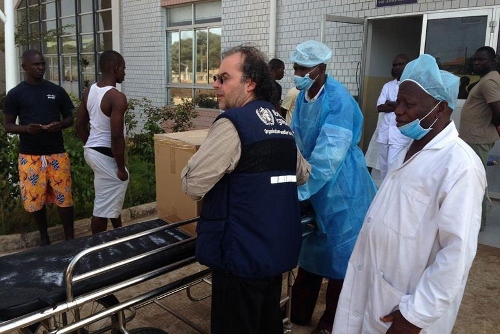December 26, 2025 06:34 pm (IST)

WHO works on to contain Ebola outbreak in Guinea
New York, Apr 2 (IBNS): The number of suspected and confirmed cases of Ebola (EVD) in Guinea has jumped from 103 to 122 in just three days, with 80 confirmed deaths, said the United Nations World Health Organization (WHO), which will now focus on preventing further transmissions of the often fatal disease.
“The incubation period for all strains of Ebola is between two and 21 days,” said WHO spokesman Gregory Härtl, as he explained on Tuesday at a press briefing in Geneva that the agency has taken “the maximum incubation period and multiplied it by two to get the length of time needed to ensure no onwards transmission.”
“Communication with local communities and their education is of crucial importance,” he stressed.
According to WHO, the source of infection has been localized in the south east of Guinea. In Liberia, the seven infected – four of whom have died – are Liberians who had recently travelled to Guinea and were subsequently contaminated. The previously suspected Sierra Leone cases have been tested negative.
The Ebola virus first appeared in 1976 in two simultaneous outbreaks in Sudan and Democratic Republic of the Congo (DRC) and it does not normally cause a large number of cases – the largest outbreaks were of approximately 400 cases. However, with no treatment and no cure, it has a very high fatality rate of up to 90 per cent.
Ebola is introduced into the human population through close contact with the blood, secretions, organs or other bodily fluids of infected animals. In Africa, infection has been documented through the handling of infected chimpanzees, gorillas, fruit bats, monkeys, forest antelope and porcupines found ill or dead or in the rainforest.
Ebola then spreads in the community through human-to-human transmission, with infection resulting from direct contact (through broken skin or mucous membranes) with the blood, secretions, organs or other bodily fluids of infected people, and indirect contact with environments contaminated with such fluids.
Though smaller than past outbreaks in DRC and Uganda, the current Guinea Ebola cases fit the patterns of all previous outbreaks, said Härtl, explaining that the virus spread from the rural villages of the rainforest in the south east to the capital Conakry as the infected sought medical attention in the city.
Härtl stressed that in an outbreak the priority is stopping chain transmission and tracing all contacts. “The contacts need to be followed up for a period of 21 days and ensured against inadvertently spreading the disease to someone else,” he explained, adding that 11 health care workers have been confirmed as having contracted Ebola.
“WHO has been working both with Médecins sans Frontières and the Ministry of Health to ensure that the proper practices and equipment have been put in place to protect all these healthcare workers from the virus. Personal Protection Equipment has already been shipped, and more is on its way,” said Härtl.
He emphasized that, in public health terms, the current scope of the outbreak does not justify the use of the word “epidemic”. “The WHO is dealing with limited foci, limited geographical area and only a few chains of transmission,” he said.
For the time being, the UN health agency does not recommend any particular travel or trade restrictions.
(WHO delivers disposable personal protection equipment to isolation ward at the China-Guinea Friendship Hospital in Conakry, Guinea. Photo: WHO/T. Jasarevic)
Support Our Journalism
We cannot do without you.. your contribution supports unbiased journalism
IBNS is not driven by any ism- not wokeism, not racism, not skewed secularism, not hyper right-wing or left liberal ideals, nor by any hardline religious beliefs or hyper nationalism. We want to serve you good old objective news, as they are. We do not judge or preach. We let people decide for themselves. We only try to present factual and well-sourced news.
Support objective journalism for a small contribution.
Latest Headlines
Importance of Comparing Health Insurance for Parents Based on Features and Premiums
Mon, Dec 22 2025
Financial stress is ageing your heart faster, new study suggests
Mon, Dec 22 2025
Brazil makes history: WHO confirms elimination of mother-to-child HIV transmission!
Sun, Dec 21 2025
Game-changing blood test may spot lung cancer before symptoms appear
Fri, Dec 19 2025
One pill instead of many: Combination drugs may simplify high blood pressure treatment, says new study
Wed, Dec 17 2025







